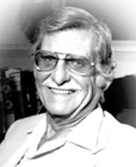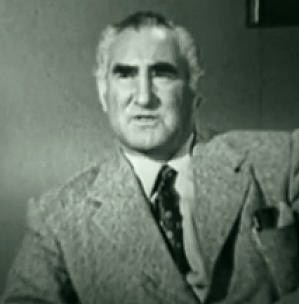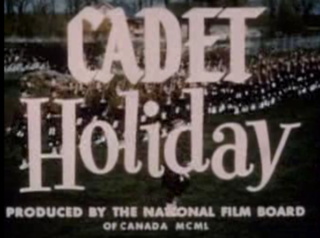Related Research Articles

The National Film Board of Canada is Canada's public film and digital media producer and distributor. An agency of the Government of Canada, the NFB produces and distributes documentary films, animation, web documentaries, and alternative dramas. In total, the NFB has produced over 13,000 productions since its inception, which have won over 5,000 awards. The NFB reports to the Parliament of Canada through the Minister of Canadian Heritage. It has bilingual production programs and branches in English and French, including multicultural-related documentaries.

Cinema in Canada dates back to the earliest known display of film in Saint-Laurent, Quebec, in 1896. The film industry in Canada has been dominated by the United States, which has utilized Canada as a shooting location and to bypass British film quota laws, throughout its history. Canadian filmmakers, English and French, have been active in the development of cinema in the United States.

John Alton, born Johann Jacob Altmann, in Sopron, Kingdom of Hungary, was an American cinematographer of Hungarian-German origin. Alton photographed some of the most famous films noir of the classic period and won an Academy Award for the cinematography of An American in Paris (1951), becoming the first Hungarian-born person to do so in the cinematography category.

Sam Katzman was an American film producer and director. Katzman produced low-budget genre films, including serials, which had disproportionately high returns for the studios and his financial backers.

Frank Radford "Budge" Crawley, was a Canadian film producer, cinematographer and director. Along with his wife Judith Crawley, he co-founded the production company Crawley Films in 1939.

Guy Mervin Charles Green OBE BSC (5 November 1913 – 15 September 2005) was an English film director, producer, screenwriter, and cinematographer. In 1948, he won an Oscar as cinematographer for the film Great Expectations. In 2002, Green was given a Lifetime Achievement Award by the BAFTA, and, in 2004, he was named an Officer of the Order of the British Empire for his lifetime contributions to British cinema.

Burnett Guffey, A.S.C. was an American cinematographer.
Harry J. Wild, A.S.C. was a film and television cinematographer. Wild worked at RKO Pictures studios from 1931 through the 1950s. In total Wild was involved in 91 major film projects and two extended television series.

Joseph Pevney was an American film and television director.
Leslie Robert Burks, A.S.C. was an American cinematographer who worked in many genres, in both black-and-white and color, and who collaborated a number of times with Alfred Hitchcock.

Winston Murray Hunt Hibler was an American screenwriter, film producer, director and narrator associated with Walt Disney Studios.
Wolf Koenig was a Canadian film director, producer, animator, cinematographer, and a pioneer in Direct Cinema at the National Film Board of Canada.

Grant Holland Crabtree was a Canadian cinematographer, director, and photographer who worked during the early years of the Canadian film industry, first for Crawley Films, then for the National Film Board and the National Research Council. His work includes the highly touted The Loon's Necklace, The Chairmaker and the Boys, Morning on the Lièvre, and Song of Seasons.
John Spotton was a Canadian filmmaker with the National Film Board of Canada.
The following is the filmography of American animator Chuck Jones.

Roy Tudor Owen, known professionally as just Tudor Owen, was a Welsh character actor. Owen is most famous for voicing the role of Towser in the 1961 Disney movie One Hundred and One Dalmatians.
Gudrun Bjerring Parker is a Canadian filmmaker, writer, producer and a recipient of the Order of Canada. She worked on films with the National Film Board of Canada (NFB) during the Second World War and in the early 1950s. Parker wrote the script for The Stratford Adventure, which was nominated for an academy award, and directed part of Royal Journey, which won a BAFTA. She married fellow NFB filmmaker Morten Parker. They often worked as a team on films and in 1963, they established a production company, Parker Film Associates.

Cadet Holiday is an 11-minute 1951 Canadian documentary film, made by the National Film Board of Canada (NFB) as part of the postwar Canada Carries On series. The film, directed by David Bairstow, Robert Humble and Douglas Wilkinson, was produced by Sydney Newman and Michael Spencer. Cadet Holiday was an account of a Canadian Army Cadet during a summer camp. The film's French version title is Cadets en vacances.
Guy Glover was a senior National Film Board of Canada (NFB) producer and administrator.
David Bairstow was a Canadian director, producer and screenwriter. He is best known for directing Royal Journey, which received a Canadian Film Award for best theatrical feature-length documentary and was named best documentary film of 1952 at the British Academy Film Awards, and Morning on the Lièvre, which won the Canadian Film Award for Best Theatrical Short Film in 1962.
References
- 1 2 3 4 Judy Stoffman (May 17, 2016). "Obituary: Michael Spencer: The kingmaker of the Canadian film industry". The Globe and Mail .
- 1 2 Jordan Pinto, "Feature film pioneer Michael Spencer passes away". Playback , April 22, 2016.
- 1 2 Etan Vlessing, "Michael Spencer, Pioneering Canadian Film Producer, Dies at 96". The Hollywood Reporter , April 22, 2016.
- 1 2 3 4 "Michael Spencer". Canadian Film Encyclopedia (Toronto International Film Festival).
- ↑ "Deng chief Chonkolay among 72 invested into Order of Canada". Montreal Gazette , October 19, 1989.
- ↑ John Burgess, "Genie's Spencer soiree a calorie-laden affair". Financial Post , November 24, 1992.
- ↑ Wendy McCann, "Naked Lunch sweeps Genies : Winners trash Canadian film distribution". Waterloo Region Record , November 23, 2022.